

· Por James
Top 8 Best Internet for RV Living in 2025 | Stay Connected
Hitting the Road, Staying Connected: Your Guide to RV Internet
Finding reliable internet on the road can be a challenge. This guide presents eight of the best internet options for RV living in 2025, helping you stay connected whether you're working remotely or streaming your favorite shows. Discover the pros and cons of top solutions like Starlink RV, Nomad Internet, and more, including cellular boosters and mobile hotspots, to find the best internet for RV living that fits your needs and budget. We'll cover SwiftNet Wifi, Verizon Jetpack MiFi 8800L, WeBoost Drive X RV, Unlimited LTE Advanced by Mobile Must Have, Calyx Institute Membership, and Pepwave MAX Transit Duo.
1. SwiftNet Wifi
For RV enthusiasts seeking reliable internet access, especially in rural locations where traditional options falter, SwiftNet Wifi emerges as a promising solution. This service utilizes cutting-edge 5G technology to deliver high-speed connectivity specifically designed to cater to the needs of RV travelers and residents of areas lacking fiber optic infrastructure. This means you can maintain a consistent connection for work, entertainment, and communication, no matter where your RV takes you. Imagine streaming your favorite shows, participating in video conferences without interruption, or simply browsing the web seamlessly, all while enjoying the freedom of the open road or the tranquility of a remote rural setting. SwiftNet Wifi aims to bridge the digital divide, empowering users to stay connected and productive regardless of location.
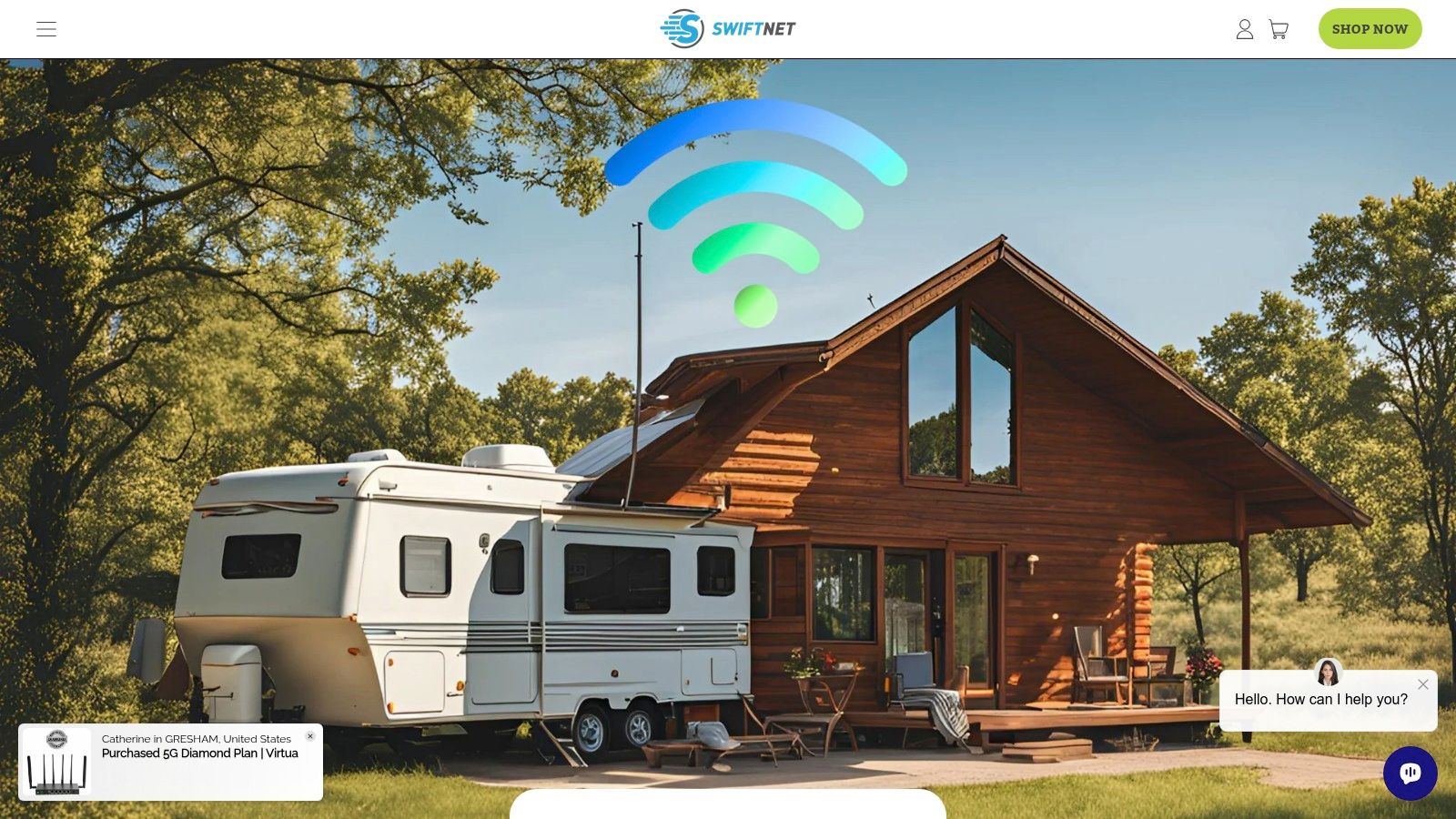
One of the key advantages of SwiftNet Wifi is its focus on mobility and rural coverage. This makes it an ideal choice for those embracing the RV lifestyle or residing in areas underserved by traditional internet providers. While many internet services struggle to maintain reliable connections outside of densely populated areas, SwiftNet Wifi strives to provide consistent performance even in more remote locations. This is particularly beneficial for remote workers and digital nomads who require dependable internet access to maintain their productivity while traveling or living off the grid. Learn more about SwiftNet Wifi for additional insights into their services.
While SwiftNet Wifi offers enticing features for those seeking the best internet for RV living, it's important to be aware of the limitations. The biggest drawback is the lack of publicly available pricing information. You'll need to contact SwiftNet directly for a quote, which can be inconvenient. Additionally, service availability is dependent on the presence of a 5G network, which might be limited in extremely remote areas. Before committing, it's crucial to verify coverage in your intended travel or living locations.
Pros:
- High-speed 5G connectivity in areas lacking fiber optic infrastructure.
- Tailored for RV travelers and rural residents, supporting mobile and remote lifestyles.
- Reliable internet coverage enabling consistent work-from-anywhere capabilities.
- Ideal for streaming, video conferencing, and online productivity on the go.
- Specialized service filling a critical connectivity gap for underserved regions.
Cons:
- Pricing information is not readily available, requiring direct inquiry.
- Service availability depends on 5G network presence, which may vary in extremely remote areas.
Website: https://swiftnetwifi.com
Despite the lack of transparent pricing, SwiftNet Wifi's focus on 5G connectivity for RV living and rural areas makes it a strong contender for anyone looking to stay connected on the road or in remote locations. Its specialized approach addresses a significant need in the market, and positive user feedback suggests that it delivers on its promise of speed and reliability. If you’re seeking an internet solution that keeps pace with your mobile lifestyle, SwiftNet Wifi is certainly worth investigating.
2. Starlink RV (Roam)
For RVers seeking consistent, high-speed internet access regardless of location, Starlink RV (now called Starlink Roam) offers a compelling solution. This satellite internet service from SpaceX is specifically designed for mobile lifestyles, eliminating the need for fixed addresses and providing reliable connectivity even in the most remote areas. Whether you're boondocking in the desert or exploring national parks, Starlink RV aims to keep you connected. This makes it a strong contender for the best internet for RV living, particularly for those prioritizing performance and availability over cost.
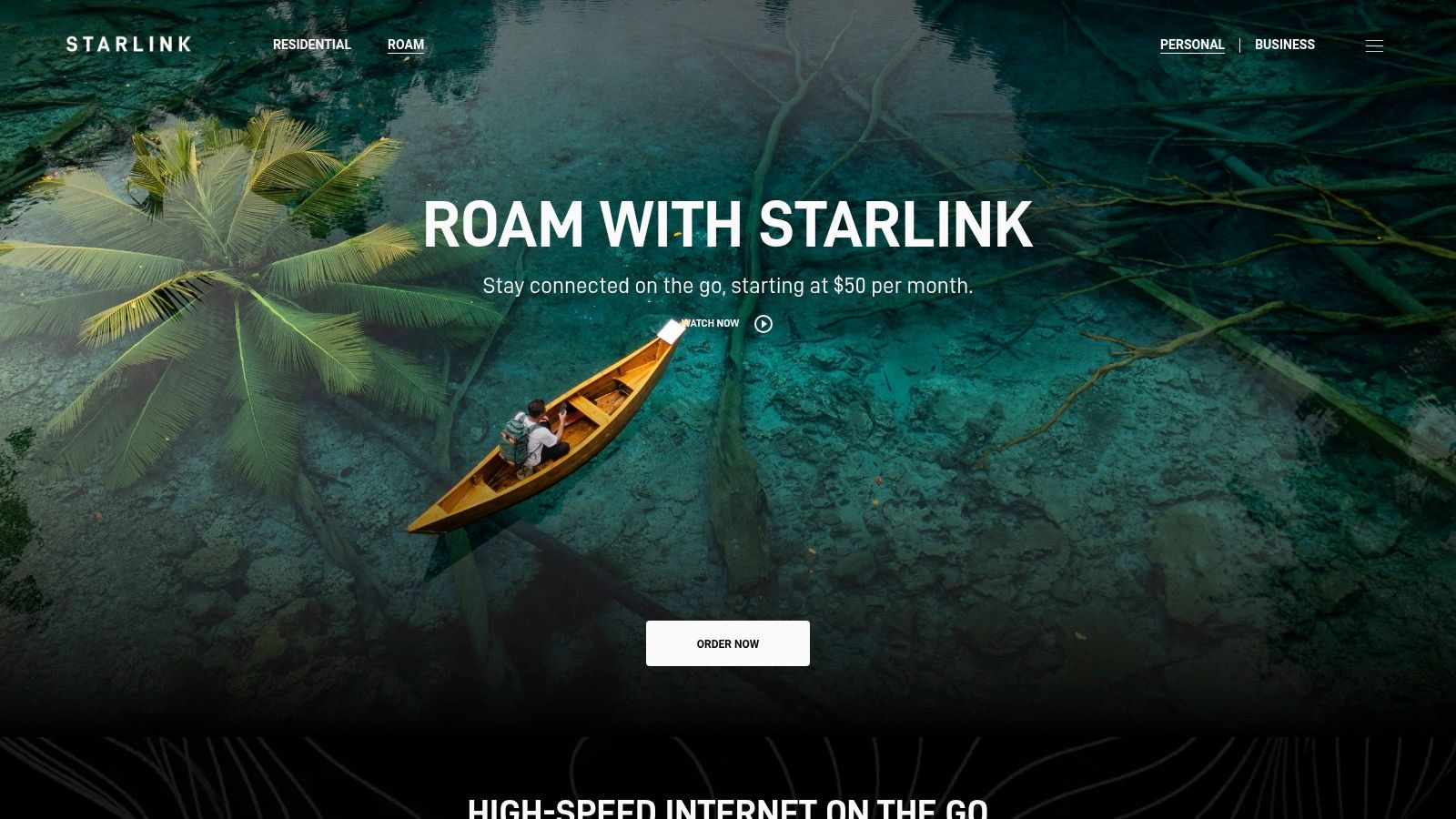
Starlink RV utilizes a portable satellite dish that's easy to set up and stow away. Simply place the dish where it has a clear view of the northern sky, connect it to power, and you're online. This ease of use, combined with the impressive download speeds of 100-250 Mbps, allows RVers to stream movies, work remotely, and stay connected with family and friends without the limitations of traditional cellular internet. The absence of data caps further enhances its appeal, allowing for uninterrupted online activities. For digital nomads and remote workers, this consistent connectivity is crucial for maintaining productivity on the road.
One of the key advantages of Starlink RV is its portability and flexibility. Unlike traditional satellite internet services, Starlink doesn't require a fixed installation or long-term contracts. The monthly service can be paused and resumed as needed, making it a cost-effective option for those who don't travel full-time. This pay-as-you-go flexibility sets it apart from other internet options for RV living. Furthermore, a global roaming option is available for users who travel internationally.
While Starlink RV offers significant advantages, there are some drawbacks to consider. The upfront equipment cost can range from $599 to $2,500 depending on the chosen hardware, representing a significant initial investment. Additionally, the monthly service fee of $150/month is higher than some cellular plans. It's also important to note that Starlink RV requires a clear view of the northern sky for optimal performance, which may be challenging in densely forested areas. Finally, the system requires a power source, consuming approximately 100W during active use. This necessitates adequate power management in your RV setup.
Key Features & Benefits:
- High-speed internet: 100-250 Mbps download speeds
- Portability: Designed for travel and easy setup
- No data caps: Unlimited usage
- Pause service: Manage costs when not in use
- No contracts: Flexibility for changing needs
- Global roaming: Available for international travel
Pros & Cons:
Pros:
- Works in remote locations beyond cellular coverage
- Consistent performance unaffected by user density
- Simple setup with minimal technical skills
- Global roaming option
Cons:
- High upfront equipment cost ($599-$2,500)
- Requires clear view of the northern sky
- Monthly service cost ($150/month)
- Requires a 100W power source
Website: https://www.starlink.com/roam
3. Verizon Jetpack MiFi 8800L
The Verizon Jetpack MiFi 8800L is a solid choice for RVers seeking reliable internet access on the go, especially those who frequent areas with strong Verizon coverage. This portable 4G LTE mobile hotspot eliminates the need for public Wi-Fi or campground connections, giving you the freedom to work, stream, and stay connected from virtually anywhere within Verizon's network. This compact device is particularly appealing for its ease of use – simply power it on and connect your devices. It's a practical solution for digital nomads, full-time RVers, and weekend warriors alike who prioritize consistent internet access as part of the best internet for RV living experience.
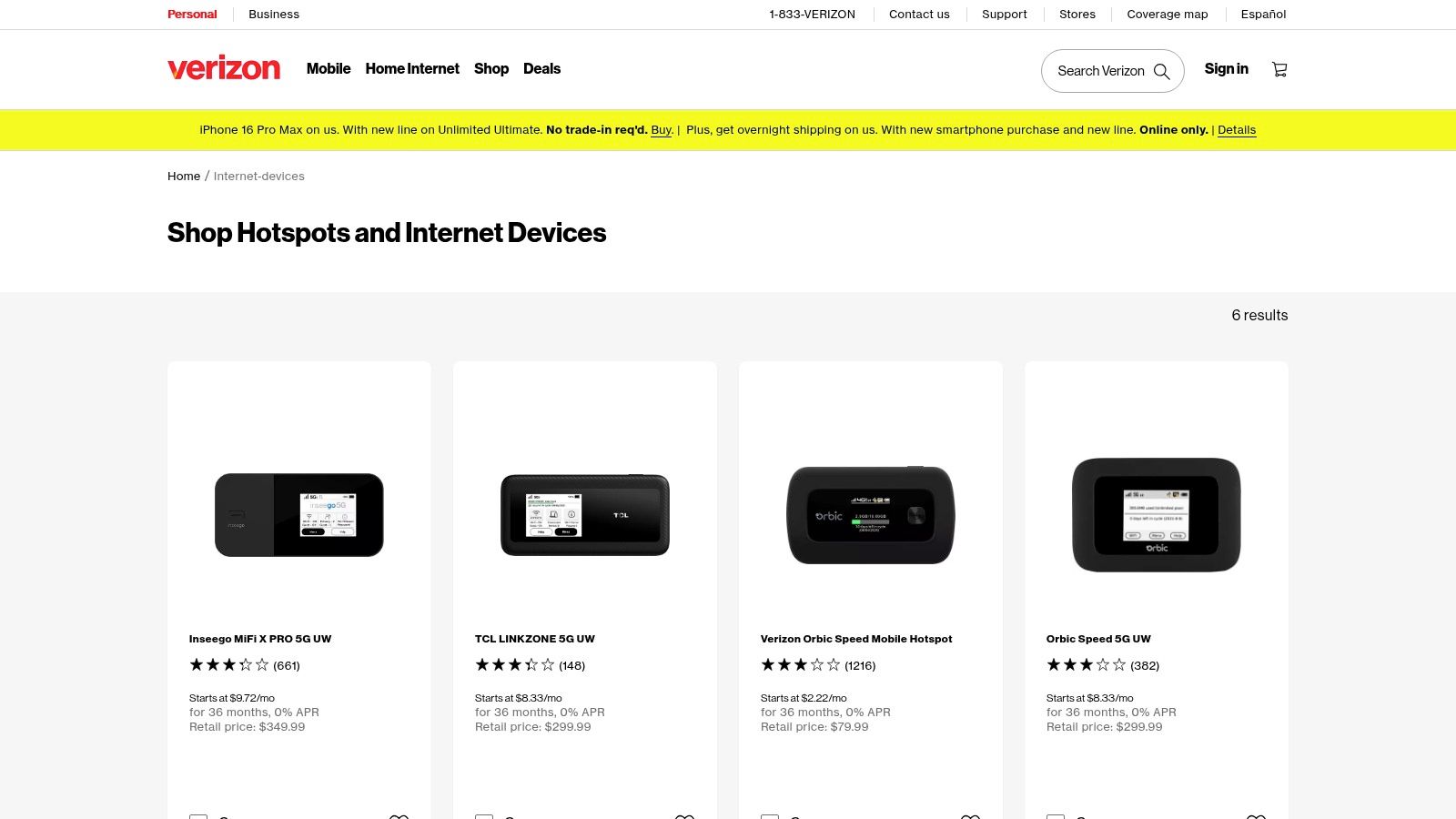
One of the key advantages of the MiFi 8800L is its ability to connect up to 15 devices simultaneously. This makes it ideal for families or groups traveling together, allowing everyone to connect their laptops, tablets, and smartphones without fighting for bandwidth. The impressive battery life, up to 24 hours on a single charge, ensures you can stay connected throughout the day without constantly searching for power outlets. Plus, the built-in 2.4-inch touchscreen simplifies setup and monitoring data usage. The device also doubles as a portable charger, offering a convenient way to top up your other devices on the go.
While the MiFi 8800L is a strong contender for best internet for RV living, it's important to consider the dependence on Verizon's network. If your travels take you to areas with weak or nonexistent Verizon coverage, this device might not be the best solution. Data plans can also be a significant cost factor for heavy internet users. Compared to newer 5G options, the 4G LTE speeds, although capable of reaching 1 Gbps under ideal conditions, might feel slower in real-world RVing scenarios. You’ll find current pricing and data plan options on the Verizon website. Finally, while offering global roaming capabilities, international data rates can be quite high.
Implementation Tips:
- Check Coverage: Before committing to the MiFi 8800L, thoroughly research Verizon's coverage map to ensure reliable service along your planned travel routes. Consider using a coverage checker app and inputting specific locations you frequent.
- Data Plan Selection: Choose a data plan that aligns with your usage needs. If you plan on streaming movies or working remotely extensively, opt for a plan with ample data to avoid overage charges.
- Signal Boosting: Consider using a signal booster to enhance connectivity in areas with marginal signal strength. This can significantly improve download and upload speeds, optimizing your online experience.
Comparison: While the MiFi 8800L offers excellent portability, those seeking a more permanently installed RV internet solution might consider a rooftop mounted cellular antenna system paired with a router. This setup can provide better signal reception and eliminates the need for a separate hotspot device.
The Verizon Jetpack MiFi 8800L represents a practical and reliable internet solution for many RVers. By understanding its strengths and limitations, you can make an informed decision on whether this device meets your specific connectivity needs for the best internet for RV living. For more details and to purchase the device, visit https://www.verizon.com/internet-devices/.
4. Nomad Internet
Nomad Internet stands out as a top contender for the best internet for RV living because it caters specifically to the unique challenges of staying connected on the road. Unlike traditional residential internet providers, Nomad Internet focuses exclusively on rural and mobile internet solutions. This makes them a popular choice for RV dwellers, digital nomads, and anyone seeking reliable internet access outside of major metropolitan areas. They offer a variety of plans leveraging major cellular carriers like Verizon, AT&T, and T-Mobile, providing flexibility and coverage across the country. They also provide the necessary equipment like routers and modems designed specifically for mobile use, taking the guesswork out of finding compatible hardware. Their plans are structured for those who need consistent internet access while traveling, ensuring you can stay connected for work, entertainment, or staying in touch with loved ones.
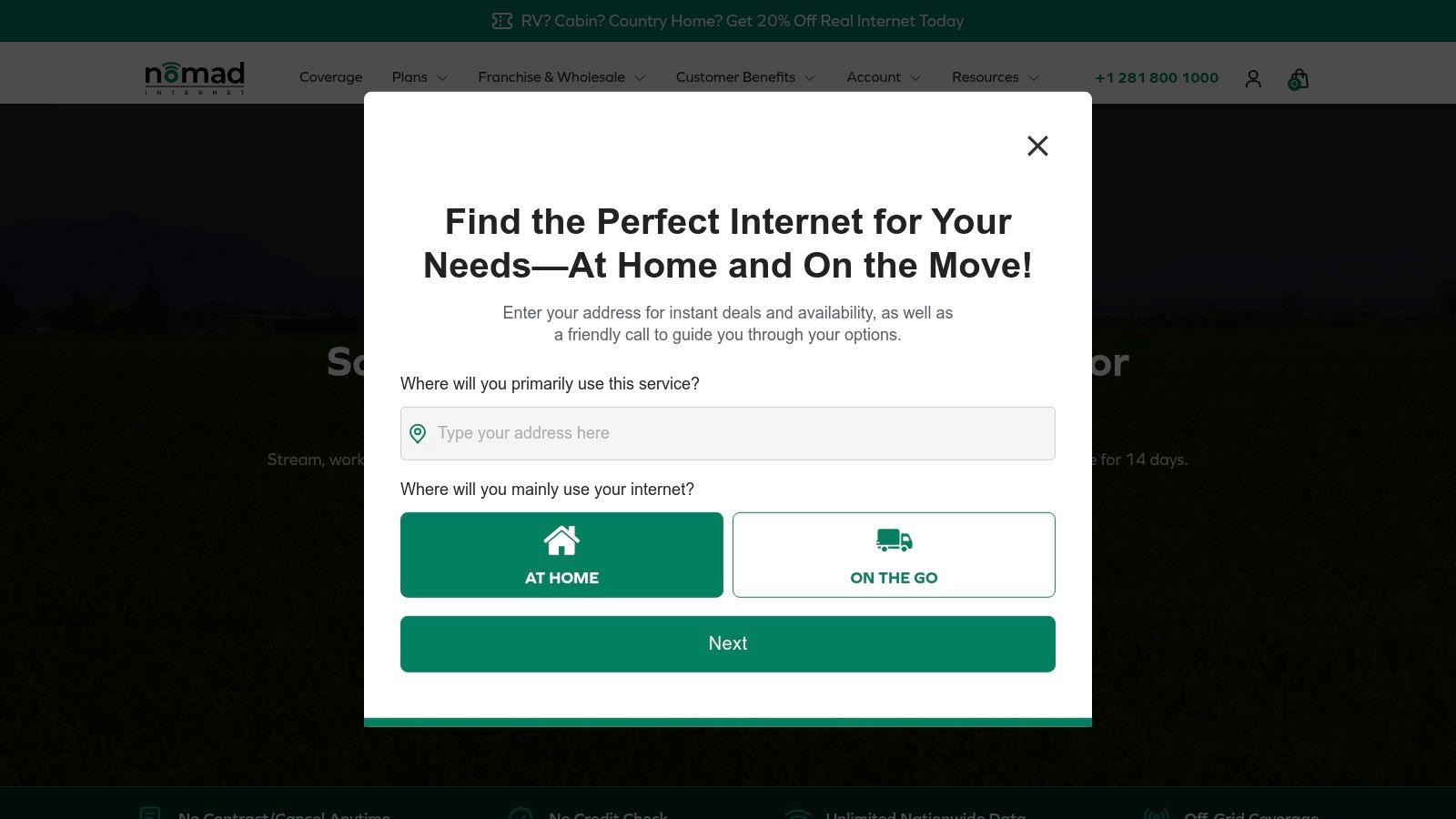
Nomad Internet offers true unlimited data plans with no throttling, a crucial feature for anyone who relies heavily on internet access. Imagine streaming movies, attending video conferences, or uploading large files without worrying about hitting a data cap or experiencing slowdowns. This "truly unlimited" aspect is a significant advantage for full-time RVers and remote workers who need consistent bandwidth. Their specialized routers are optimized for RV use, offering better signal reception and performance compared to standard residential routers. Learn more about Nomad Internet and explore their various equipment options. Furthermore, the no-contract flexibility allows users to adjust their plan as needed, providing peace of mind for those whose travel plans may change. And with a 30-day money-back guarantee, you can try their service risk-free.
One of the key benefits of choosing Nomad Internet is their customer service team's expertise in mobile internet needs. They understand the challenges of staying connected on the road and can provide tailored support based on your specific situation and location. The option to switch carriers if needed is another valuable perk, allowing you to optimize your connection based on coverage in different areas. While Nomad Internet is an excellent solution for the best internet for RV living, it's essential to consider the cost. Their plans typically range from $129 to $179 per month, which is higher than most residential internet plans. Also, some plans require an equipment purchase, adding to the initial setup cost. Performance can vary depending on location and network congestion, just like any cellular-based service. Finally, the setup can be slightly more complex than simply plugging in a hotspot, though their customer support can guide you through the process.
Despite the higher cost, Nomad Internet's focus on providing reliable, unlimited internet for RV living, combined with specialized equipment and knowledgeable customer service, makes it a worthwhile investment for those who prioritize staying connected on the go. They offer a solution tailored to the needs of digital nomads, full-time RVers, and anyone looking for the best internet for RV living, even in rural locations where traditional internet options are limited.
5. WeBoost Drive X RV
Finding reliable internet access is crucial for comfortable RV living, especially if you work remotely or enjoy streaming entertainment. While some campgrounds offer Wi-Fi, it's often unreliable and overcrowded. Cellular data can be a lifesaver, but signal strength can be spotty in remote areas. This is where the WeBoost Drive X RV shines. This powerful cell signal booster isn't an internet provider itself, but it significantly enhances your existing cellular signal, making it one of the best tools for securing reliable internet for RV living. By boosting your signal, you'll experience faster download and upload speeds, fewer dropped calls, and improved streaming quality, allowing you to stay connected even in areas with weak cellular coverage.
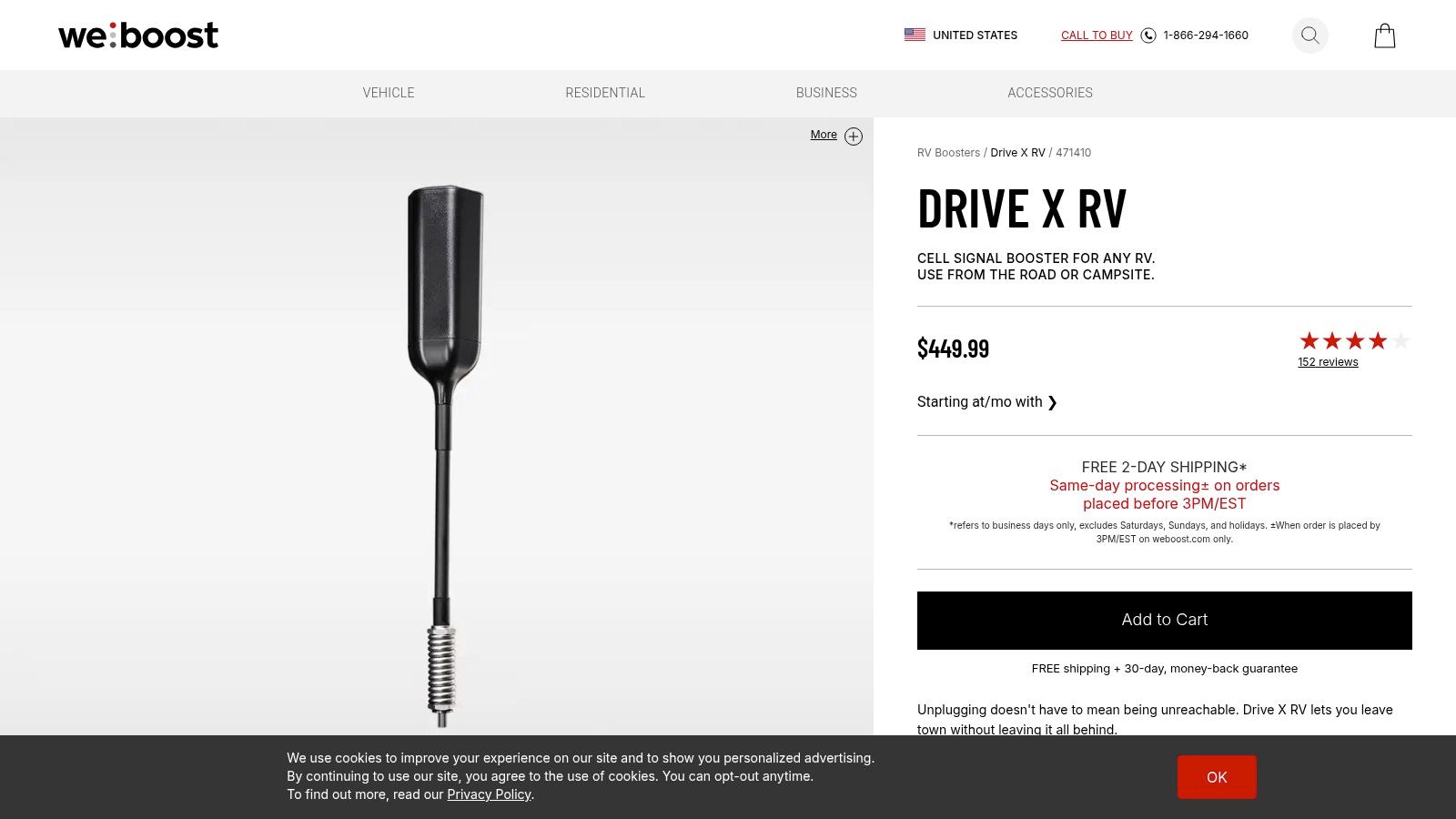
The WeBoost Drive X RV boosts 4G LTE and 5G signals for all US carriers, increasing signal strength by up to 50 dB. This means significantly improved voice, text, and data transmission for everyone inside your RV, no matter their carrier. It's compatible with all cellular devices and hotspots, making it a versatile solution for staying connected on the road. The system includes an external antenna that mounts to your RV’s ladder or roof, an amplifier, and an internal antenna that broadcasts the boosted signal inside. RV-specific mounting hardware is included, simplifying the installation process.
For RV travelers, digital nomads, and anyone seeking reliable internet in remote areas, the WeBoost Drive X RV is a game-changer. Imagine being able to work remotely from a national park or stream your favorite shows in the middle of the desert. This booster makes it possible. While you can use the WeBoost while driving, it’s particularly beneficial when parked in areas with weak signal strength. It effectively extends the usable range of your cellular internet, turning previously inaccessible areas into productive workspaces or entertainment hubs.
The WeBoost Drive X RV comes with a hefty price tag of $499.99, representing a significant initial investment. However, considering the cost of alternative internet solutions for RV living, like satellite internet with its monthly fees, the WeBoost Drive X RV becomes a more appealing option in the long run as a one-time purchase. Keep in mind, it can’t create a signal where absolutely none exists; it amplifies existing signals. While you can attempt DIY installation, professional installation is recommended for optimal performance. Some technical knowledge is helpful for positioning the external antenna to maximize signal reception.
For those serious about consistent internet access while RVing, the WeBoost Drive X RV is a worthwhile investment. It’s a powerful tool that bridges the connectivity gap, allowing you to enjoy the freedom of the open road without sacrificing the conveniences of modern technology. You can learn more and purchase the WeBoost Drive X RV at https://www.weboost.com/products/drive-x-rv.
6. Unlimited LTE Advanced by Mobile Must Have
For RVers serious about reliable, unrestricted internet access, Mobile Must Have's Unlimited LTE Advanced packages offer a compelling solution, making it a top contender for the best internet for RV living. Unlike consumer-grade hotspots that often throttle speeds or impose usage caps, Mobile Must Have provides truly unlimited 4G LTE data with no throttling, perfect for those who work remotely, stream media heavily, or rely on consistent connectivity. They achieve this by reselling plans from major carriers but with specialized terms tailored to mobile users. Learn more about Unlimited LTE Advanced by Mobile Must Have
One of the key advantages of Mobile Must Have is their focus on high-performance equipment. They offer packages including pre-configured routers like the Pepwave MAX Transit Duo, renowned for its ability to connect to multiple carriers simultaneously. This dual-carrier capability provides redundancy and improved connection stability – crucial for RV travelers navigating areas with varying signal strengths. They also offer enterprise-grade equipment options and compatibility with external antennas, allowing you to maximize signal reception even in remote locations.
This system shines in its ability to overcome the connectivity challenges faced by RV dwellers, particularly those who work online remotely or live in rural areas without fiber optic internet. Imagine streaming your favorite shows seamlessly in the middle of the desert, or attending a virtual meeting without interruption from a mountaintop campsite. This level of connectivity comes at a price, however.
While Mobile Must Have offers some of the best internet for RV living in terms of performance, it's essential to consider the cost. Expect higher upfront costs for the premium equipment, ranging from $800 to $2,000. Monthly service plans also lean towards the pricier side, starting at $150+ per month. This is considerably more expensive than basic consumer hotspot options. Furthermore, the setup can be more complex than simply plugging in a hotspot, and maximizing performance may require some technical knowledge.
Features:
- Truly unlimited data with no throttling
- Dual-carrier capable routers available (e.g., Pepwave MAX Transit Duo)
- Enterprise-grade equipment options
- External antenna compatibility
- Specialized support for RV users
Pros:
- High-performance equipment options for reliable connectivity
- Ability to combine multiple carriers for redundancy and improved signal
- No video streaming restrictions
- Technical support specifically tailored for mobile users
Cons:
- Higher upfront costs for premium equipment ($800 - $2,000)
- Monthly service plans are more expensive than consumer options ($150+/month)
- More complex setup than simple hotspots
- Requires some technical knowledge to optimize performance
Website: https://www.mobilemusthavenow.com/
In summary, Mobile Must Have provides a robust and reliable internet solution for RV living, ideal for those prioritizing consistent, unrestricted connectivity above budget considerations. If you're a traveler who works online remotely, lives in a rural area, or simply demands high-performance internet on the road, Mobile Must Have deserves a place on your shortlist.
7. Calyx Institute Membership
For RVers seeking truly unlimited internet access without the constraints of data caps or throttling, the Calyx Institute offers a compelling solution. This non-profit organization provides membership packages that include unlimited wireless internet service leveraging T-Mobile's extensive network, making it a serious contender for the best internet for RV living. This option is particularly appealing to full-time RVers and those who rely heavily on data-intensive tasks like streaming and video conferencing.
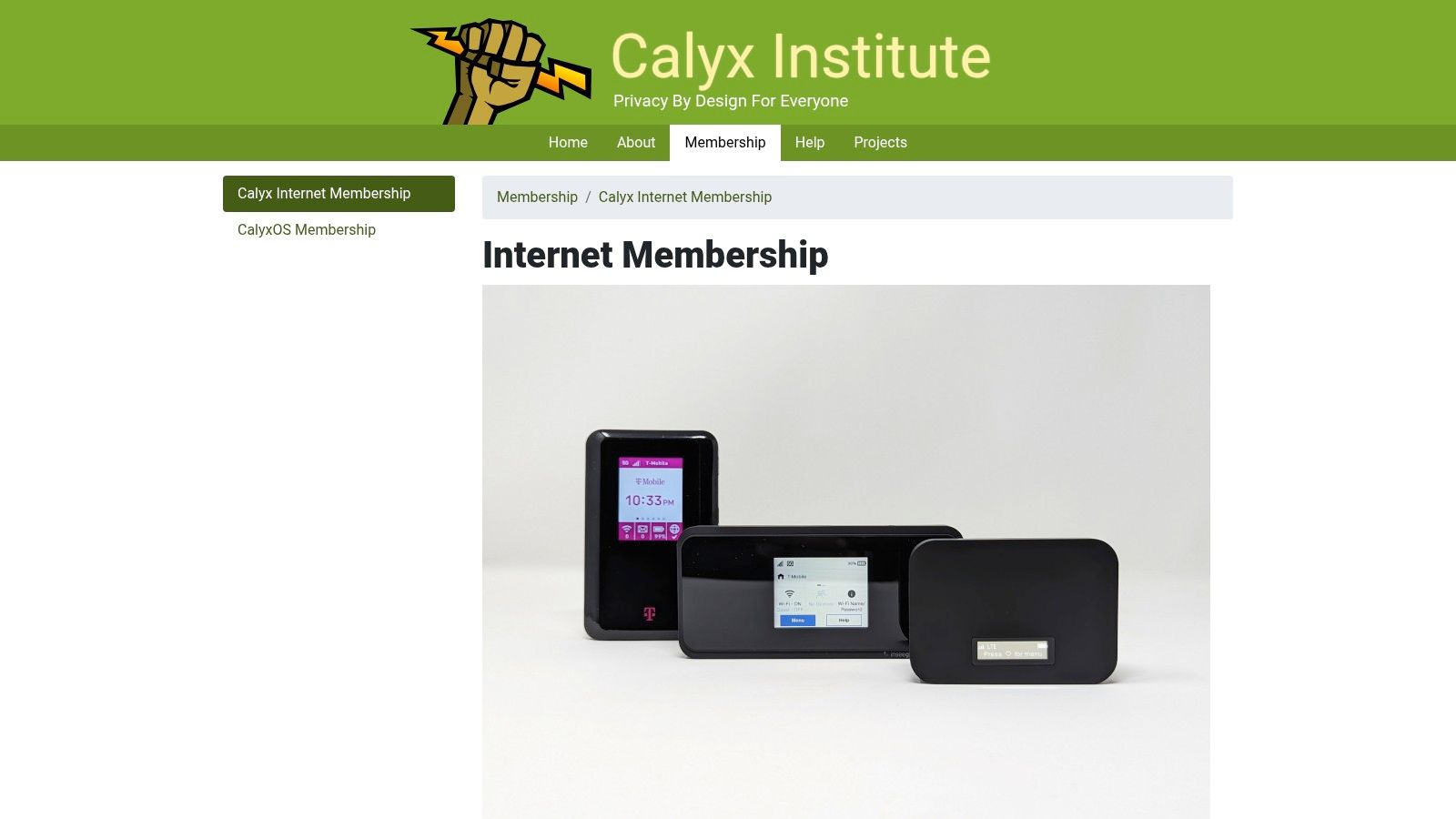
A Calyx Institute membership provides more than just internet access; it supports an organization dedicated to digital freedom and privacy advocacy. Your annual membership fee covers a full year of service and includes a mobile hotspot device. This upfront payment model simplifies budgeting and eliminates the surprise of fluctuating monthly bills. The absence of contracts beyond the annual commitment offers flexibility for those whose RV lifestyle might change. The straightforward pricing structure provides excellent value, particularly when compared to the often-inflated costs of traditional mobile hotspot plans with comparable data allowances (which, in Calyx's case, is truly unlimited).
While Calyx Institute offers a unique advantage with its genuinely unlimited data, it's essential to consider its reliance on the T-Mobile network. If T-Mobile coverage is spotty in your anticipated travel areas, this might not be the ideal solution. You can check T-Mobile’s coverage map to ensure your route aligns with their service area. Furthermore, the upfront annual payment might be a barrier for some, and the limited customer support compared to larger commercial providers is something to keep in mind. Device options may also be more limited than those available from mainstream carriers. However, for those prioritizing unlimited data and supporting a privacy-focused non-profit, these trade-offs may be worthwhile.
Key Features and Benefits:
- Truly Unlimited Data: No throttling or data caps. Download, stream, and work without concern.
- Annual Membership with Hotspot Device: One upfront payment simplifies budgeting and provides a dedicated hotspot.
- No Contracts: Flexibility to renew or discontinue after the annual term.
- Supports Digital Freedom: Contribute to a non-profit dedicated to online privacy.
- Cost-Effective: Offers significant savings compared to monthly unlimited data plans.
Pros:
- Genuine unlimited data with no hidden caps.
- Significantly lower cost than monthly plans.
- Non-profit organization with a privacy focus.
- Simple, straightforward pricing.
Cons:
- Relies solely on T-Mobile network coverage.
- Annual payment required upfront.
- Limited customer support compared to commercial providers.
- Device options may be more limited than commercial alternatives.
Website: https://calyxinstitute.org/membership/internet
Calyx Institute membership stands out as an excellent option for the best internet for RV living if your travels align with T-Mobile's coverage map and you value truly unlimited data and supporting a non-profit organization. Its straightforward pricing and lack of data caps make it a compelling choice for digital nomads, full-time RVers, and anyone seeking unfettered internet access on the road.
8. Pepwave MAX Transit Duo
For RV users who prioritize reliable, uninterrupted internet access above all else, the Pepwave MAX Transit Duo stands out as a top-tier solution for finding the best internet for RV living. This powerful mobile router isn't an internet provider itself, but rather a sophisticated tool that allows you to connect to multiple cellular carriers simultaneously. This "carrier aggregation" creates redundancy and dramatically improves connection stability, a crucial factor for those working remotely or relying on the internet for entertainment while on the road. It's designed to keep you connected even when traveling through areas with spotty cell service from any single provider.
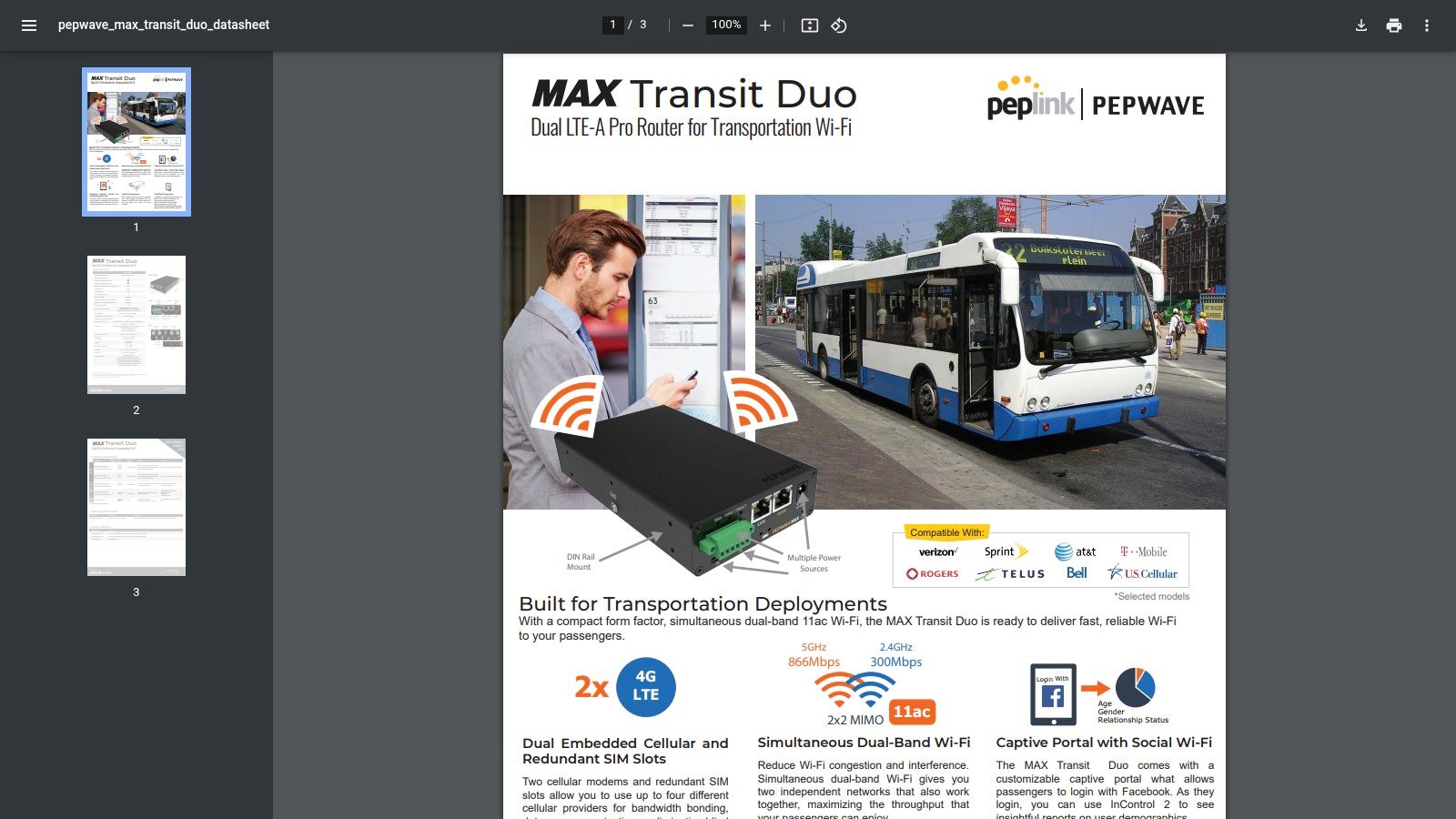
The Pepwave MAX Transit Duo shines in its ability to manage multiple connections seamlessly. Its dual cellular modems accommodate SIM cards from different carriers, intelligently switching between them or even combining their bandwidth for maximum speed. Imagine streaming a movie without buffering, even as you transition between coverage areas – that's the power of the MAX Transit Duo. Moreover, its WiFi as WAN capability allows you to connect to campground WiFi when available, conserving your cellular data. For those living the digital nomad lifestyle or running a business from their RV, this feature is invaluable.
This router also offers advanced features like GPS tracking (useful for fleet management), sophisticated traffic management tools to prioritize bandwidth for specific applications, and enterprise-grade security features to protect your data. While it does require some technical knowledge to configure initially, the benefits far outweigh the learning curve for serious RV internet users.
Pricing and Technical Requirements:
The Pepwave MAX Transit Duo comes with a higher upfront cost, typically ranging from $999 to $1,299. It requires separate data plans from your chosen cellular carriers. You'll also need SIM cards compatible with the device and your chosen carriers. Consider external MIMO antennas for significantly improved signal reception, particularly in remote areas.
Pros:
- Carrier diversity: Minimizes connectivity issues by connecting to multiple carriers.
- Automatic failover: Seamlessly switches between connections for uninterrupted service.
- External antenna compatibility: Boosts signal strength with MIMO antenna support.
- Highly configurable: Offers granular control over network settings for advanced users.
Cons:
- High upfront cost: Represents a significant investment.
- Requires separate data plans: Adds to the ongoing monthly expense.
- Complex setup: Demands some technical expertise for initial configuration.
- Overkill for casual users: Less demanding users might find simpler (and cheaper) options sufficient.
Implementation/Setup Tips:
- Research compatible carriers and data plans in your travel areas.
- Invest in high-quality external antennas for optimal performance.
- Familiarize yourself with the Pepwave interface and configuration options. Peplink offers extensive documentation and support resources.
Comparison:
While other mobile routers exist, few offer the same level of performance and control as the Pepwave MAX Transit Duo. Less expensive options may suffice for casual users, but for those who demand the most reliable and robust internet connection possible in their RV, the MAX Transit Duo is a worthwhile investment.
Website: https://www.peplink.com/products/max-transit-duo/
This device earns its place on the list of best internet for RV living because it delivers on its promise of reliable connectivity. It's the ultimate solution for serious RVers who need to stay connected no matter where the road takes them.
Top 8 RV Internet Providers Comparison
| Service / Device | Core Features / Connectivity | User Experience & Quality ★★★☆☆ | Value & Pricing 💰 | Target Audience 👥 | Unique Selling Points ✨ |
|---|---|---|---|---|---|
| 🏆 SwiftNet Wifi | High-speed 5G for rural & RV areas | ★★★★☆ Reliable, fast | 💰 Not listed, inquire directly | 👥 Rural residents, RV travelers | ✨ Specialized for rural/RV use |
| Starlink RV | Satellite 5G, portable dish, no data caps | ★★★★☆ Low latency, easy setup | 💰 $150/month + $599-$2,500 equip | 👥 Full-time RVers needing global access | ✨ Works almost anywhere, pause service |
| Verizon Jetpack MiFi 8800L | 4G LTE hotspot, up to 15 devices, battery powered | ★★★★☆ Reliable where Verizon covers | 💰 Variable plans, mid-high cost | 👥 RV travelers in Verizon areas | ✨ Portable with long battery life |
| Nomad Internet | Multi-carrier (Verizon, AT&T, T-Mobile), unlimited data | ★★★★☆ Mobile-optimized plans | 💰 $129-$179/month | 👥 Full-time RVers wanting carrier options | ✨ Carrier switching, RV-specific gear |
| WeBoost Drive X RV | 4G/5G signal booster for RVs | ★★★☆☆ Signal improvement only | 💰 $499.99 one-time | 👥 RV owners needing stronger cellular signals | ✨ Cellular boost up to 50 dB |
| Unlimited LTE Advanced | Unlimited 4G LTE data, dual carrier routers | ★★★★☆ High-performance gear | 💰 $150+/month + $800-$2,000 equip | 👥 Tech-savvy RV users desiring redundancy | ✨ Multi-carrier failover, enterprise gear |
| Calyx Institute Membership | Unlimited T-Mobile data, yearly hotspot & service | ★★★☆☆ Unlimited, privacy focused | 💰 One annual payment, affordable | 👥 Privacy-conscious full-time RVers | ✨ Non-profit, low cost unlimited |
| Pepwave MAX Transit Duo | Dual-cellular modems, WiFi as WAN, GPS, advanced security | ★★★★☆ Enterprise-grade reliability | 💰 $999-$1,299 device cost + plans | 👥 Advanced RV users needing top reliability | ✨ Multi-carrier, advanced traffic mgmt |
Choosing the Right Path to Connectivity
Finding the best internet for RV living can feel overwhelming, but with the right tools, staying connected on the road is easier than ever. We've covered a range of options, from satellite internet like Starlink RV and Nomad Internet, to mobile hotspots such as the Verizon Jetpack MiFi 8800L and Unlimited LTE Advanced by Mobile Must Have, and cellular router solutions like the Pepwave MAX Transit Duo and Calyx Institute Membership. We even looked at signal boosters like the WeBoost Drive X RV. Each solution caters to different needs and budgets, so consider your data usage, technical comfort level, and how critical consistent connectivity is for your work and leisure.
Slow internet speeds can significantly impact your RV living experience. Before committing to an internet provider, it's crucial to test your current connection speed to establish a baseline and understand your needs. A good website speed test from CLDY's Website Speed Test: A Practical Guide to Boosting Your Site Performance can help you determine your requirements. Remember that factors like your typical location (urban vs. rural) and the number of devices you'll be connecting simultaneously will influence your ideal setup.
Ultimately, the best internet for RV living is the one that empowers you to live, work, and explore freely. Don't let connectivity concerns hold you back from embracing the open road. Want a simple, reliable, and fast internet solution designed specifically for RV life? Check out SwiftNet Wifi for a seamless online experience wherever your adventures take you.

